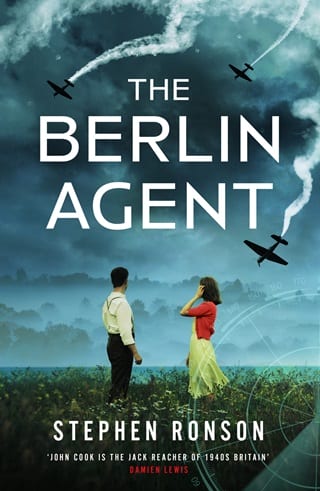21
Mrs Leckie was on her knees in her front garden, a large sunhat her only concession to the heatwave. There was a breeze up on the hilltop, and she had the hat tied under her chin with a scarf. I’d never seen her without a heavy cardigan and this morning was no exception. She had a punnet full of strawberries, and was busy pulling out runners, -tutting at each one, as if it were a naughty schoolchild.
‘You turn your back on these for one minute,’ she said, pulling up a long chain of plants, linked by thin tendrils. She shook the soil off and dropped the offending plants in a trug by her side.
‘Had any more trouble from your landlord?’ I asked, standing politely on the other side of the garden wall.
‘No, I don’t think they’ll be back, do you? You were very effective,’ she said. ‘Glad you found your métier. Certainly wasn’t schoolwork.’
‘I was a late bloomer.’
‘That’s all right,’ she said. ‘We’re not all cut out to be poets. Someone’s got to do the dirty work.’
She looked across the road.
‘Where’s your van?’ she asked. ‘Don’t want to leave it on the road. Those lorries don’t slow down for love nor money.’
‘I walked. Wanted to stretch my legs.’
‘I’m surprised they let you through,’ she said. ‘They’re meant to be on the lookout for suspicious-looking men.’
‘Had to go the long way round. Came around past -Underhill.’
The shortest route would have taken me through Maresfield, but what was normally a sleepy hamlet was fast turning into a no-go area, fenced off and guarded by clipboard--wielding sentries. A large contingent of Canadian troops had been barracked there, and rumours in town said an -additional camp was being built for prisoners of war.
‘I was worried about you,’ I said. ‘I heard rumours of a parachutist.’
‘You don’t strike me as the kind of man who listens to fishwives’ gossip,’ she said, giving me a piercing stare.
‘You haven’t seen anyone suspicious?’ I asked. ‘Heard any German voices coming out of the ether?’
‘If Hitler wants to send someone to spy on me, that’s his lookout,’ she said. ‘Can’t imagine it’ll do him much good.’
‘What about those lorries?’ I asked.
She shuffled along on the grass to the next section of the combined flower and vegetable bed, grabbed the trug and pulled it closer, and set to work again.
‘Some kind of works,’ she said, ‘all very hush hush.’
‘What do they do there?’ I asked.
She shook her head.
‘I’ve got better things to do than go playing detective. Leave all that to the youngsters.’ She looked at me meaningfully. Based on my performance at school she probably thought I was a bit dull, had to drill the point home.
‘Go out through the gate at the end of the back garden,’ she said. ‘You don’t want to walk up to them on the road. They’ll shoot first, ask questions later.’
It was a glorious morning, out on the open heath, under the vast sky. The gorse was popping in the heat, giving off waves of vanilla. I kept Palehouse Lane as a reference, off to my left, a hundred yards away through head-height gorse and thickets of birch. Close enough to keep my bearings, far enough that I wouldn’t be seen by anyone on the road. I was doing a recce of what sounded like a military installation. That could be taken the wrong way. People had been taken away and not seen again. The War Powers Act gave the -security services unlimited power.
To my right I had a grand view of the upper slopes of the Forest, mostly clear heath, with clumps of towering pine trees at some of the highest points. I wouldn’t have liked to live here. The views were magnificent, but it was too -exposed. No defensible perimeter. One of the things we’d learnt quickly on the Afghan frontier – wherever you set up camp, you want a perimeter of defences. The only way to sleep easy.
I looked back towards the Leckies’ house but the slope of the hill had hidden it beyond the horizon. I was completely alone, with no signs of civilisation in any direction. With the brown of the sun-parched grass and heather, and the sound of the insects, I could have been on the savannah. Only the criss-crossing vapour trails above me, fighters out to intercept the Luftwaffe over the Channel, indicated any sign of life.
The slope led me gently down to the bottom of a valley, the vegetation closing in, more birch and pine, and the peaty smell of water as I came to a slow-moving stream. Without noticing, I’d got closer to the road. The distant roar of a heavy engine signalled another lorry.
I slipped back into the cover of the undergrowth as the lorry swept around a corner. It had come from behind me, from the Leckies’ house. It was loaded down, khaki canvas covering odd shapes on the flatbed. Delivering supplies, presumably. As it rounded the corner, the clutch crunched and the lorry jolted as the driver put it into a low gear. It started its slow grind up the next hill, working its way back up through the gears.
I let it get a good distance from me, waiting until the quiet returned. No point trying to sneak up on a secret installation if I couldn’t hear what was going on around me. When it was completely quiet, I retraced my steps back into the woods, then headed onwards, uphill again. I kept the road a hundred yards to my left.
As I climbed the slope, the undergrowth thinned out again, a subtle change minute by minute, but half a mile of it put me back onto the top of the next dome, back in the sky with the Forest laid out at my feet. Behind me, the Leckies’ house was now a feature on the horizon, commanding its own -hilltop.
‘Hello!’
I spun around, shocked that I’d let another man come up on me without me hearing.
‘Over here,’ he said. He was sitting in the shade of a gorse bush. That explained why I hadn’t heard him, he hadn’t been moving. I’d been the one blundering through the heather, giving my position away.
It was the young man from the debate. Vaughn’s opponent, who’d wanted to do away with the royal family.
I put a genial smile on my face, the way men do when they’ve gone for a walk to get away from humanity but bump into another person. The mutual pretence of civility. As I approached, I sized him up. Mid-twenties. Expensively dressed in an urban man’s approximation of the country life – plus fours, tweed, a jaunty cap.
‘Morning,’ I said.
‘Going to be another scorcher by the look of it,’ he said.
He was sitting on a small stool, a clever device that looked like it was designed to fold up, all steel tubes and webbing. In front of him, he had a canvas propped up on an easel. He held a palette in his left hand and a knife in his right.
His painting was a work in progress, but he’d already captured the sweep of the skyline. I recognised the Leckies’ cottage – a dab of white amidst the slopes of purple heather.
‘Such a peaceful spot,’ he said, ‘apart from those blasted lorries.’
‘I gather there’s a works up the way,’ I said.
He looked over his shoulder, following my nod, but he didn’t seem overly interested.
‘You should be careful,’ I said, ‘I hear it’s hush hush, you might get in trouble if they see you out here painting -pictures.’
‘Oh, I don’t think I’m much of a threat,’ he said, returning to his work. He smeared a generous dollop of black across the white canvas, above the purple slopes. I looked up at the sky, a pure deep blue.
‘Enjoy the day,’ I said to him, setting off. I’d have to change my route, couldn’t let on to him where I was -heading.
‘It’s more to the left,’ he said. I stopped, my foot crunching on a dried clump of heather.
‘The secret installation,’ he said. He winked at me. ‘Not that you’re going there, of course.’
 Fullepub
Fullepub 



